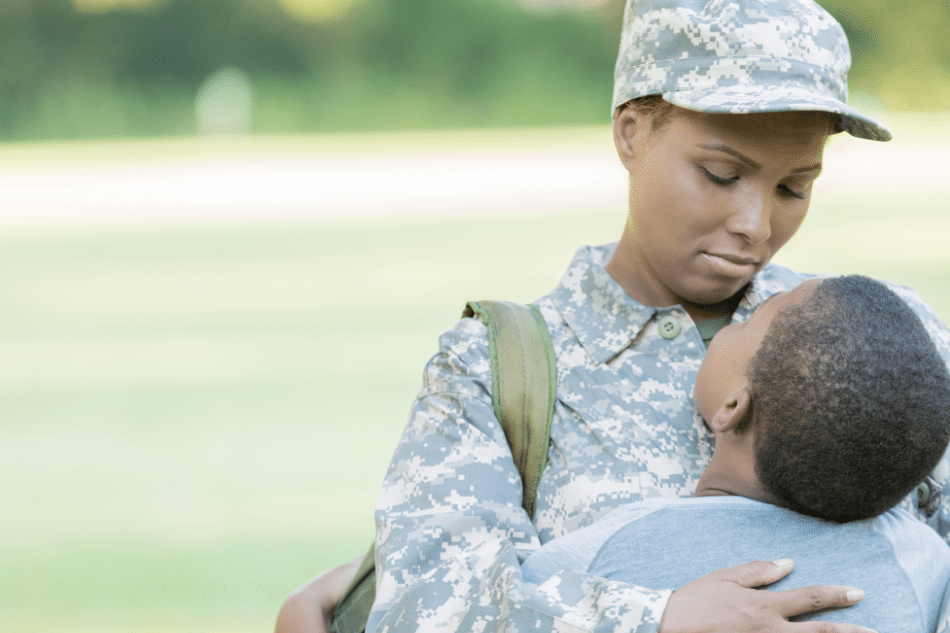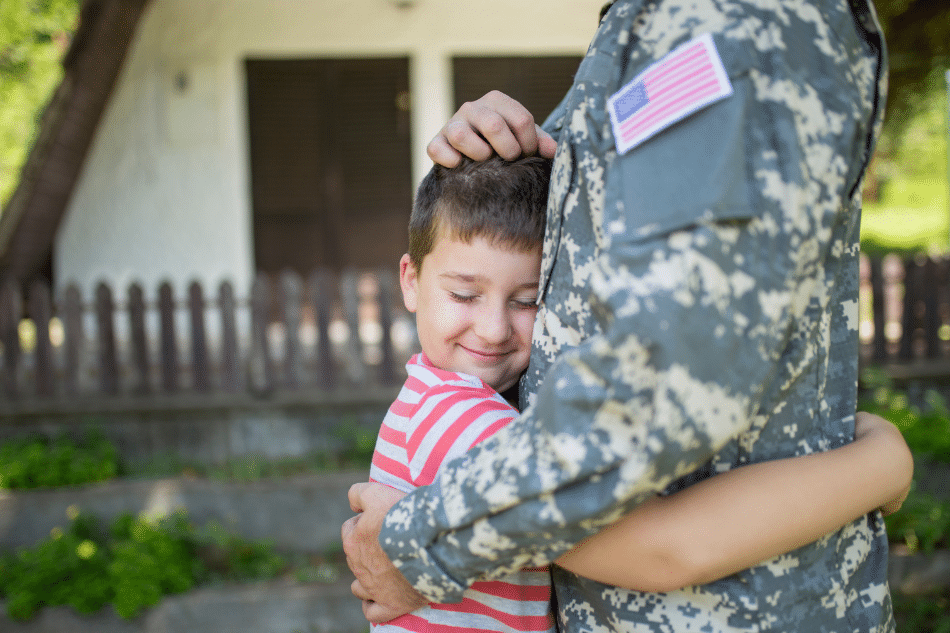How Deployment Impacts Teen Mental Health: Signs and Support Strategies

More than 2 million children have had a parent deployed in the last 25 years.1 Deployed parents might be sent anywhere in the world for combat or peacekeeping operations. This means they’re away from their families for any length of time – from several weeks to over a year. And it’s not just the deployed parent who’s affected; families left behind must adapt to life without them, which can impact the whole family unit.
The impact of deployment on military teens is particularly complex, perhaps because they’re already in a difficult stage of their lives. Yet, deployment and military life, in general, can cause an increased risk of a range of mental health and behavioral issues, putting military teens in need of extensive support.
If you’re concerned about the impact of deployment on military teens, a mental health professional can guide you on the right actions to take. This article also works as a helpful tool, walking you through…
- How deployment can affect teen mental health
- What the emotional cycle of deployment is
- How to support your teen through deployment
- What increased resilience in military families looks like
- Where to find professional mental health support for your teen

How Does Deployment Affect Teen Mental Health?
The mental health effects of deployment on teenagers are well-understood. For instance, we know that military-connected youth are more likely to report low well-being, persistent feelings of hopelessness, emotional problems, and low life satisfaction. They’re also more likely to engage in overt risk-taking.2
Research suggests the four main stressors military children face include:1
- Relocation
- Family separation
- Adaptation to danger
- Military culture.
The deployment of a parent can involve most of these, such as injury (or the threat of), the death of a family member, and the traumatic impact of a temporarily absent parent.1 Military culture may also send a message to children to “be strong,” causing them not to admit when they’re struggling.
Additionally, when parents are deployed and families experience extended separations, there can be a significant disruption to routines. Parenting abilities may also be compromised due to traumatic experiences and subsequent mental health issues. Plus, detriment in marital relationships and between parents and children can take a significant toll on everyone within the family unit.3
These factors make military children and teens more likely to experience behavioral problems, decreased academic performance, increased emergency and specialist visits, and somatic symptoms (physical illness with an emotional cause). They’re also connected to an increased use of antidepressants and anti-anxiety medications.1
The stress of deployment on family systems might also be associated with disordered eating and teens being more worried about their body weight and shape.5
Signs Your Teen is Struggling
The impact of deployment on military teens can understandably be concerning, but there are ways to support them. Now that you understand what factors might be influencing your teen, the next step is knowing what signs to look out for.
Anxiety in military teens might manifest as changes to sleep or appetite and unexplainable physical complaints. Anxiety and emotional trauma in military youth might also show up as hypervigilance. Or they might appear to be avoidant, emotionally numb, or suffer from nightmares. Additionally, if a teen is anxious, they might also speak to you about their constant worries.
PTSD in teens with deployed parents might be more likely if they experience repeated deployments, the sudden injury or death of that parent, or a lack of support when struggling. Signs of PTSD include, but aren’t limited to, nightmares or flashbacks, intense emotional reactions, noticeable social withdrawal, and risky behavior.
Even though adolescence can be a difficult time, the signs of emotional difficulties shouldn’t be underestimated as typical teenage angst. Understanding what your teen is going through can help you make steps to protect their well-being.
What is the Emotional Cycle of Deployment?
The experience of deployment can be thought of as a cycle since it has a few stages, and these can recur with subsequent deployments. Each stage brings on different emotional states for family members.1 The following is a rough outline of each stage:
- Pre-deployment: This stage may be associated with dread as family members anticipate the deployment and make plans for how they’ll cope.
- Deployment: During this stage, the family will be adjusting, and teenagers might rebel, take on responsibility, or avoid discussing their deployed parents to cope with the loss.
- Sustainment: This stage might see teenagers engage in risky or attention-seeking behaviors. However, establishing a stable routine during this time can help them adapt to the deployment.
- Redeployment: When anticipating homecoming, there may be excitement and relief, but teens might also feel their independence is threatened or struggle to connect with their returning parents.
- Post-deployment: Teenagers might struggle with their parents’ return, as it’s another disruption. For instance, they might find it hard if the returned parent has come back with PTSD.6
The deployment cycle and adolescent well-being are worth looking at because it can help you understand what your teenager is experiencing. Deployment affects children differently at each stage, which means they’ll need different kinds of support throughout the process.
Supporting Your Teenager Through Deployment
As a parent, you will likely feel the impact of deployment on military teens. With one in four military children experiencing an emotional-behavioral challenge as a result of deployment, it can be a challenging time for you all.1 However, the following are ways you can support your teenager through deployment.
Look After Yourself
As the parent left behind, you might be feeling alone. It’s good to remember that, although your teenager does need support from you at this time, it shouldn’t come at the expense of your own well-being. When caregivers struggle with poor mental health, children tend have a harder time during deployment.1 Therefore, it’s important that you seek support when needed and practice self-care – for your own sake and your children’s.
Understand Your Teenager
Research into how adolescents are affected by the temporary absence of a parent identifies four commonly recurring themes that influence the experience. These are:4
- Communication among family members
- Parenting characteristics during the absence
- Negotiation of decision-making power and authority
- Shifts in family roles
The following is our advice on how to navigate these themes and make the experience of deployment more comfortable for your teen.
- Family communication: Communication is a known protective factor in reducing the challenges to military families experiencing deployment.1 Open dialogues give you the best chance at resolving conflicts, negative feelings, and stress within your home. Regularly check in with your teen without smothering them, let them know you are always there to chat honestly, and validate their feelings if they open up.
- Parenting characteristics: Your traits are very influential in the atmosphere of your home. During this time, your teenager needs you to be emotionally available. The way you model emotional regulation will provide a template for them, so be mindful that you’re not pretending everything’s OK when it isn’t. Plus, maintain consistent boundaries; you need to keep a steady routine and don’t want to be too strict or too permissive.
- Decision-making power and authority: Behavioral issues are normal in teenagers from time to time, but deployment may exacerbate them. Your teen might want to take on more responsibility, be treated maturely, or push back against your boundaries. Be clear about your limits whilst still affording them the trust that’s appropriate for young adults.
- Shifts in family roles: Your teen might feel the need to step up and replace their absent parent. Yet they should be allowed to be a normal teenager. There’s a balance between giving responsibility and the freedom to experience a normal teenage life.
Encourage Your Teen to Socialize
Socializing with other military children during deployment is another protective factor for your teenager during this time. Since they have shared experiences of frequent relocations, separations, deployment, and living on military bases, military teens often share a certain bond and camaraderie. So, peer support during this time should be encouraged.1
Consider Deployment Interventions
If you’re thinking about seeking outside support, one option could be a deployment intervention. These are programs specifically designed to help military families with the challenges of deployment and other aspects of military life. They include:
- Families OverComing Under Stress: The FOCUS project provides resilience training to military families, children, and couples, teaching practical skills to help overcome common challenges associated with military life.
- Sesame Workshop’s Talk, Listen, Connect: This initiative equips families with child-friendly resources (like activities, storybooks, and bilingual videos) to help them with the challenges of military life.
- Family Advocacy Program: This is a Defence Department program that promotes healthy family relationships, prevents abuse and neglect, supports new parents, and addresses domestic violence and problematic sexual behavior in young people.
Access Mental Health Resources for Military Kids
Another form of outside help includes tools, services, and resources that can provide your teen with information or assistance with their mental health.
Mental health resources for military kids are crucial because many live in remote locations away from a military community. When it’s not possible to access help directly from on-base services, the impact of deployment on military teens could be greater. For instance, families might have to rely on civilian healthcare providers or other resources. Our article on how to confidentially access mental health resources could also help.
Think About Therapy for Children of Deployed Parents
If some of the signs of mental distress in teens mentioned in this article resonate with you, you might be considering therapy for your teenager. Therapy is a great option for working through the impact of deployment on military teens.
In therapy, teens are given a confidential space to talk through their feelings. They will also be given the opportunity to develop coping strategies for deployment stress and work through any other emotional difficulties they might be having.
You can facilitate therapy for your teen by reaching out to your healthcare insurance provider, their primary doctor, or Military OneSource.
Increased Resilience in Military Families
Family separation and teen mental health are intrinsically linked. However, as serious as the impact of deployment can be on the mental health of teenagers, a lot of research observes greater levels of resilience in children from military families.
This is reassuring; your children will not necessarily always struggle with their mental health. Military children are seen to have greater coping skills, enhanced social connections, lower emotional-behavioral-social symptoms, and a stronger family bond.1
Plus, if the steps to supporting teens during deployment are taken, you’re further ensuring that your teen develops healthy resilience and giving them access to a bright, promising future.

Get Support for your Military Teen from Mission Prep
Whether your teenager is struggling with anxiety, depression, PTSD, or general difficulties as a result of a deployed parent, we can offer support at Mission Prep.
We understand the impact of deployment on military teens and their families. Our therapeutic services blend time-tested approaches with innovative interventions and take a comprehensive view of the family unit. We provide a range of support, including talking therapies for individuals and families, life skills courses, transition support, and academic help.
Deployment mental health support can be transformative for military families. Contact our team today to find out more about how we can help your teen.
References
- Huebner, C. R. (2018). Health and Mental Health Needs of Children in US Military Families. Pediatrics, 143(1), e20183258. https://doi.org/10.1542/peds.2018-3258
- Mahar, A. L., Cramm, H., King, M., King, N., Craig, W. M., Elgar, F. J., & Pickett, W. (2023). A cross-sectional study of mental health and well-being among youth in military-connected families. Health Promotion and Chronic Disease Prevention in Canada : Research, Policy and Practice, 43(6), 290–298. https://doi.org/10.24095/hpcdp.43.6.03
- Paley, B., Lester, P., & Mogil, C. (2013). Family Systems and Ecological Perspectives on the Impact of Deployment on Military Families. Clinical Child and Family Psychology Review, 16(3), 245–265. https://doi.org/10.1007/s10567-013-0138-y
- Rodriguez, A. J., & Margolin, G. (2014). Parental Incarceration, Transnational Migration, and Military Deployment: Family Process Mechanisms of Youth Adjustment to Temporary Parent Absence. Clinical Child and Family Psychology Review, 18(1), 24–49. https://doi.org/10.1007/s10567-014-0176-0
- Higgins Neyland, M. K., Shank, L. M., Burke, N. L., Schvey, N. A., Pine, A., Quattlebaum, M., Leu, W., Gillmore, D., Morettini, A., Wilfley, D. E., Stephens, M., Sbrocco, T., Yanovski, J. A., Jorgensen, S., Klein, D. A., Olsen, C. H., Quinlan, J., & Tanofsky‐Kraff, M. (2019). Parental deployment and distress, and adolescent disordered eating in prevention‐seeking military dependents. International Journal of Eating Disorders, 53(2), 201–209. https://doi.org/10.1002/eat.23180
- Wright-Patterson Family and Support Services. (2024, April). The emotional cycle of deployment: A military family perspective [PDF]. Wright-Patterson AFB. Retrieved June 6, 2025, from https://wrightpattfss.com/wp-content/uploads/2024/04/4.-The-Emotional-Cycle-of-Deployment.pdf













